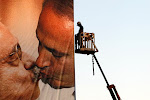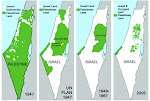Off the wall: Israeli security barrier rerouted

Israeli authorities have agreed to dismantle and reroute part of the separation barrier near Qalqilya. But will they follow through? BBC reports:
Israel's defense ministry has said it will dismantle a section of the West Bank barrier, improving Palestinians' access to some of their farm land.
The Israeli supreme court ruled in 2006 that the route should be altered, but no alternative path was agreed.
But farmers in Jayyus village say the new proposed route is a "disaster" and still cuts off much of their land.
Israel says the barrier is necessary to prevent attacks from the West Bank, but critics see its route as a land grab.
The defence ministry said on Monday it had told the Supreme Court it would revise the route in the area, near the northern West Bank town of Qalqilya.
In its 2006 ruling, the court criticised the government for taking into consideration expansion plans for the nearby Jewish settlement of Tzufin, rather than just security concerns, in determining the barrier's route.
According to the Council for Peace and Security, an Israeli security think tank that proposed an alternative route similar to the revised route, the cost of dismantling the existing section will be US $14.5m.
It said the defence ministry had previously resisted the proposed changes, citing "inferior" security provision among its reasons.
Correspondents say that while the government's decision to heed the court's ruling is significant, there is no indication that actual work to re-route the barrier is imminent.
Sharif Omar, a farmer from Jayyus village, told the BBC News Website said that the new route would return about 2,600 dunums (260 hectares) of land to the village side of the barrier, but farmers would still have to cross it reach a further 6,000 dunums (600 hectares) and several key wells.
Map
Currently the villagers have to obtain special permits to cross the barrier to reach their land through gates which are only open at certain times of day. Mr Omar said it was unclear whether there would be a gate in the re-routed section.
"Ninety percent of the village population works in agriculture - if we lose our land we will be beggars," he said.
The supreme court must still rule on the alternative route to be used - the villagers want the barrier to follow the Green Line, which marks the boundary that separates Israel from the West Bank.
Israel began building the West Bank barrier in 2002.
It has been widely criticised internationally for looping into Palestinian areas around Israeli settlements, rather than following the Green Line.
The International Court of Justice ruled in 2004 that the barrier is illegal where it cuts into the West Bank and called for it to be pulled down.


































